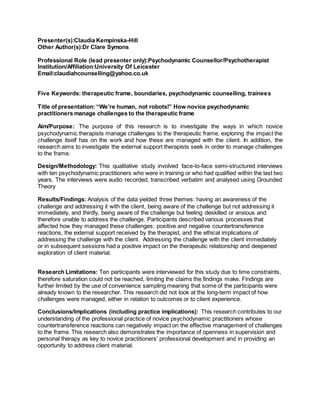BACP RESEARCH ABSTRACT
Novice psychodynamic therapists face challenges to maintaining proper therapeutic boundaries with clients. This study interviewed 10 such therapists to understand how they manage these challenges. The results identified three main approaches: addressing challenges directly with clients, being aware of but delaying addressing challenges, and feeling unable to address challenges due to anxiety. How therapists handled challenges depended on their countertransference reactions, external supervision, and ethical considerations. Addressing challenges openly with clients strengthened the relationship and therapy. The study was limited by its small sample size and convenience sampling. It provides insight into how challenges impact novice therapists and the importance of supervision for their development.

Recomendados
Recomendados
Más contenido relacionado
La actualidad más candente
La actualidad más candente (20)
Similar a BACP RESEARCH ABSTRACT
Similar a BACP RESEARCH ABSTRACT (20)
BACP RESEARCH ABSTRACT
- 1. Presenter(s):Claudia Kempinska-Hill Other Author(s):Dr Clare Symons Professional Role (lead presenter only):Psychodynamic Counsellor/Psychotherapist Institution/Affiliation:University Of Leicester Email:claudiahcounselling@yahoo.co.uk Five Keywords: therapeutic frame, boundaries, psychodynamic counselling, trainees Title of presentation:“We’re human, not robots!” How novice psychodynamic practitioners manage challenges to the therapeutic frame Aim/Purpose: The purpose of this research is to investigate the ways in which novice psychodynamic therapists manage challenges to the therapeutic frame, exploring the impact the challenge itself has on the work and how these are managed with the client. In addition, the research aims to investigate the external support therapists seek in order to manage challenges to the frame. Design/Methodology: This qualitative study involved face-to-face semi-structured interviews with ten psychodynamic practitioners who were in training or who had qualified within the last two years. The interviews were audio recorded, transcribed verbatim and analysed using Grounded Theory Results/Findings: Analysis of the data yielded three themes: having an awareness of the challenge and addressing it with the client, being aware of the challenge but not addressing it immediately, and thirdly, being aware of the challenge but feeling deskilled or anxious and therefore unable to address the challenge. Participants described various processes that affected how they managed these challenges: positive and negative countertransference reactions, the external support received by the therapist, and the ethical implications of addressing the challenge with the client. Addressing the challenge with the client immediately or in subsequent sessions had a positive impact on the therapeutic relationship and deepened exploration of client material. Research Limitations: Ten participants were interviewed for this study due to time constraints, therefore saturation could not be reached, limiting the claims the findings make. Findings are further limited by the use of convenience sampling meaning that some of the participants were already known to the researcher. This research did not look at the long-term impact of how challenges were managed, either in relation to outcomes or to client experience. Conclusions/Implications (including practice implications): This research contributes to our understanding of the professional practice of novice psychodynamic practitioners whose countertransference reactions can negatively impact on the effective management of challenges to the frame. This research also demonstrates the importance of openness in supervision and personal therapy as key to novice practitioners’ professional development and in providing an opportunity to address client material.
